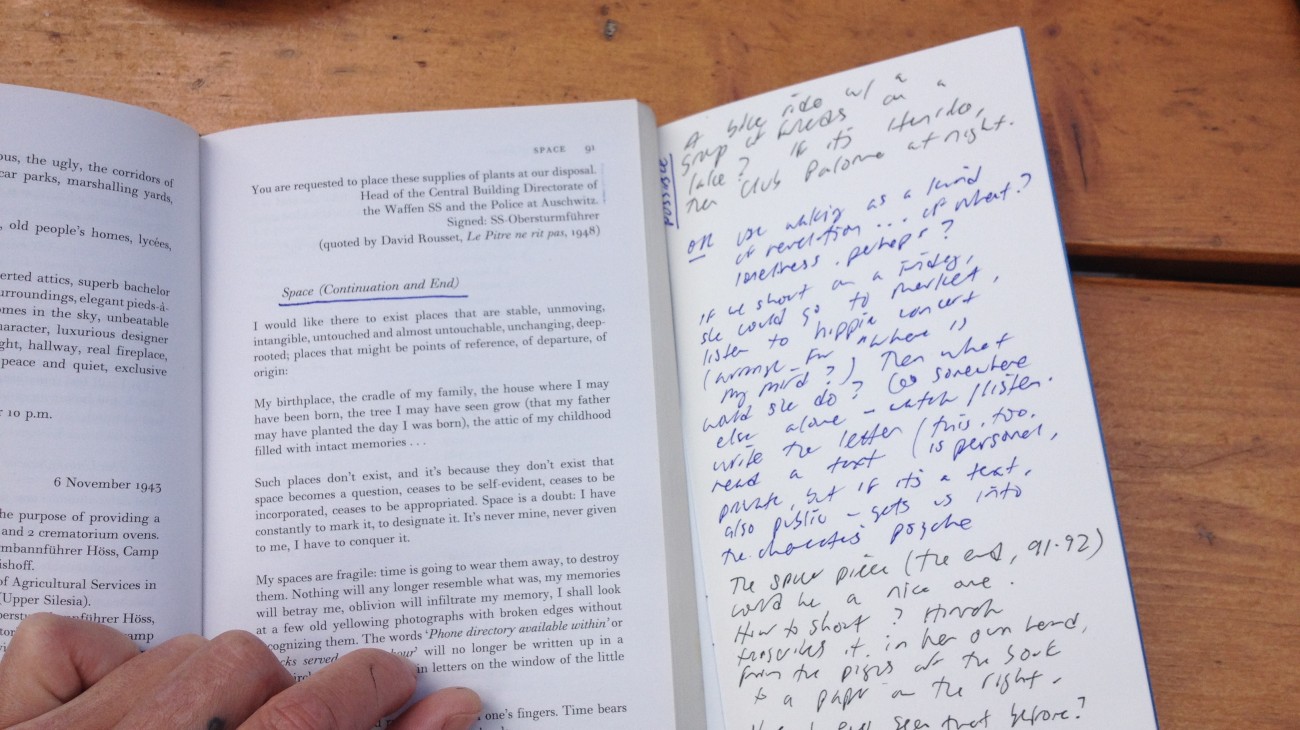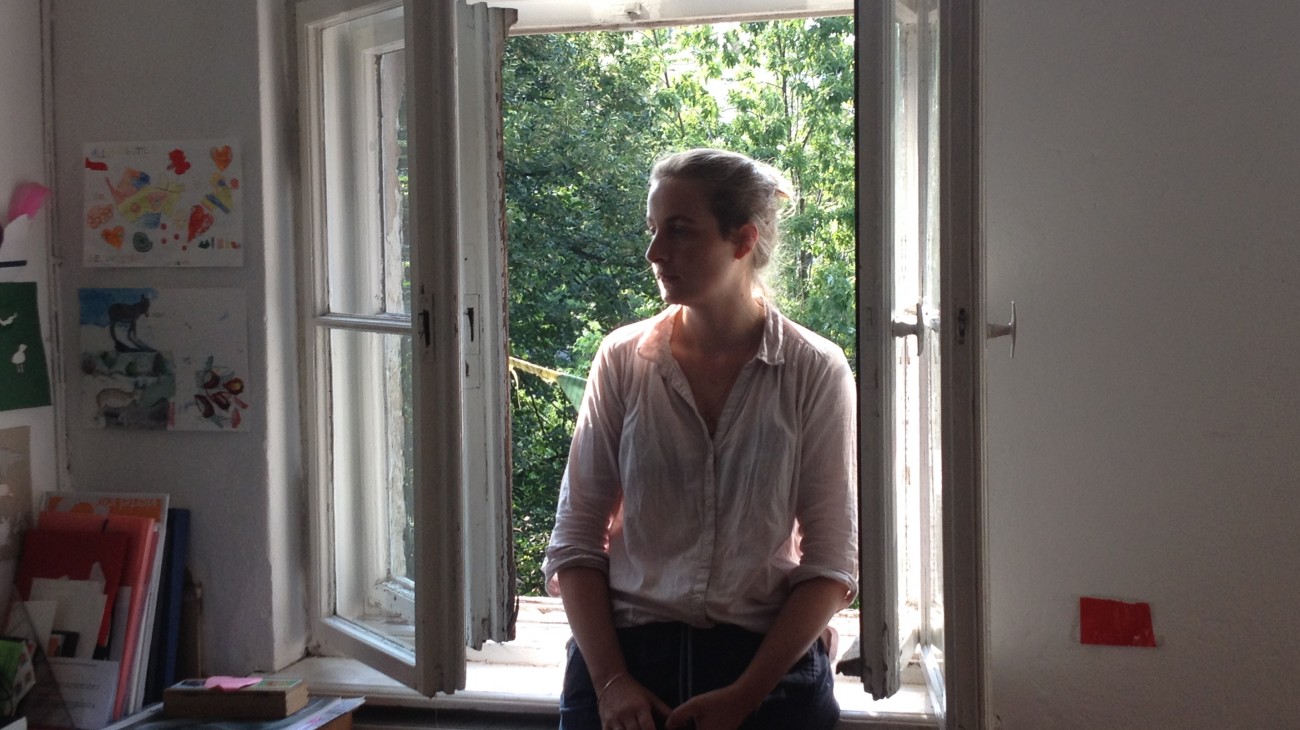Notes on Berlin film, July 7
– par Matt Porterfield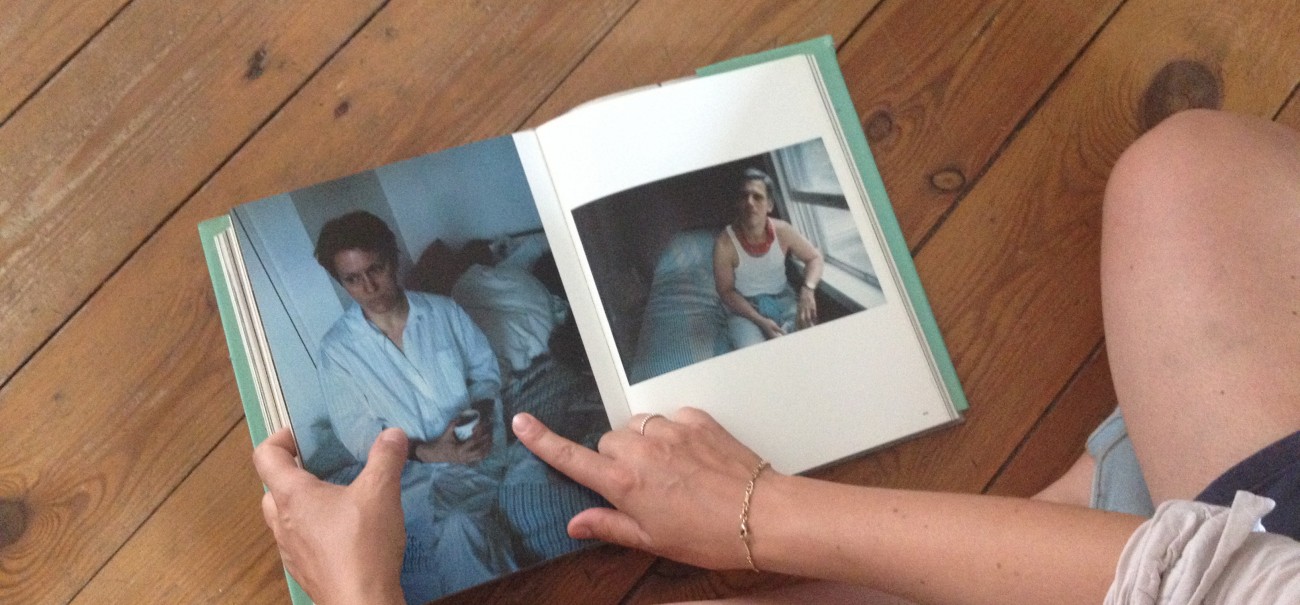
Photography by Matt Porterfield.
Voir les 2 photos
Cet article fait partie d’un cycle
Matt Porterfield’s short film Take What You Can Carry is still visible for one week on the Café en revue. Here are some notes that led to the final version of the screenplay, whose mail inspiration comes from Georges Perec’s Species of Spaces. A collection of words and ideas, sounds and images, doubts: Matt Porterfield opens his sketchbook.
There are several texts from Georges Pérec’s Species of Spaces and Other Pieces that I’d like to incorporate. At the very least, they provide inspiration. Here are a few…
1. Staircases
We don’t think enough about staircases.
Nothing was more beautiful in old houses than the staircases. Nothing is uglier, colder, more hostile, meaner, in today’s apartment buildings.
We should learn to live more on staircases. But how ?
2. Doors
We protect ourselves, we barricade ourselves in. Doors stop and separate.
The door breaks space in two, splits it, prevents osmosis, imposes a partition. On one side, me and my place, the private, the domestic; on the other side, other people, the world, the public, politics. You can’t simply let yourself slide from one into the other, can’t pass from one to the other, neither in one direction nor in the other. You have to have the password, have to cross the threshold, have to show your credentials, have to communicate, just as the prisoner communicates with the world outside.
How to be specific ? It’s not a matter of opening or not opening the door, not a matter of ‘leaving the key in the door’. The problem isn’t whether or not there are keys: if there wasn’t a door, there wouldn’t be a key.
3. Walls
I put a picture up on a wall. Then I forget there is a wall. I no longer know what there is behind this wall, I no longer know there is a wall, I no longer know what a wall is. I no longer know that in my apartment there are walls, and if there weren’t any walls, there would be no apartment. The wall is no longer what delimits and defines the place where I live, that which separates it from other places where other people live, it is nothing more than a support for the picture. But I also forget the picture, I no longer look at it, I no longer know how to look at it. I have put the picture on the wall so as to forget there was a wall, but in forgetting the wall, I forget the picture, too. There are pictures because there are walls. We have to be able to forget there are walls, and have found no better way to do that than pictures. Pictures efface walls. But walls kill pictures. So we need continually to be changing, either the wall or the picture, to be forever putting other pictures up on walls, or else constantly moving the picture from one wall to another.
What does it mean to live in a room ? Is to live in a place to take possession of it ?
4. The Bedroom
What does it mean to live in a room ? Is to live in a place to take possession of it ? What does taking possession of a place mean ? As from when does somewhere become truly yours ? Is it when you’ve put your three pairs of socks to soak in a pink plastic bowl? Is it when you’ve heated up your spaghetti over a camping-gaz ? Is it when you’ve used up all the non-matching hangers in the closet? Is it when you’ve pinned to the wall an old postcard showing Carpaccio’s ‘Dream of St Ursula’ ? Is it when you’ve experienced there the throes of anticipation, or the exaltations of passion, or the torments of a toothache? Is it when you’ve hung suitable curtains up on the windows, and put up the wallpaper, and sanded the parquet flooring ?
5. Things we ought to do systematically from time to time
In the building you live in:
go and call on your neighbors; look at what there is on the party wall, for example; confirm, or belie, the homotopology of the accommodation. See what use they have made of it;
notice how unfamiliar things may come to seem as a result of taking staircase B instead of staircase A, or of going up to the fifth floor when you live on the second;
try to imagine on what a collective existence might be based, within the confines of the same building.
look upwards.
6. Rough draft of a letter
I think of you, often
Sometimes I go back into a café, I sit near the door, I order a coffee. I arrange my packet of cigarettes, a box of matches, a writing pad, my felt-pen on the fake marble table
I spend a long time stirring my cup of coffee with the teaspoon (yet I don’t put any sugar in my coffee, I drink it allowing the sugar to melt in my mouth, like the people of the North, like the Russians and Poles when they drink tea)
I pretend to be preoccupied, to be reflecting, as if I had a decision to make
At the top and right of the sheet of paper, I inscribe the date, sometimes the place, sometimes the time, I pretend to be writing a letter
I write slowly, very slowly, as slowly as I can, I trace, I draw each letter, each accent, I check the punctuation marks
I stare attentively at a small notice, the price-list for ice-creams, at a peice of ironwork, a blind, the hexagonal yellow ashtray (in actual fact, it’s an equilateral triangle, in the cutoff corners of which semi- circular dents have been made where cigarettes can be rested)
Outside there’s a bit of sunlight
The café is nearly empty
Two renovators’ men are having a rum at the bar, the owner is dozing behind his till, the waitress is cleaning the coffee machine
I am thinking of you
You are walking in your street, it’s wintertime, you’ve turned up your foxfur collar, you’re smiling, and remote
7. Space (Continuation and End)
I would like there to exist places that are stable, unmoving, intangible, untouched and almost untouchable, unchanging, deep-rooted; places that might be points of reference, of departure, of origin:
My birthplace, the cradle of my family, the house where I may have been born, the tree I may have seen grow (that my father may have planted the day I was born), the attic of my childhood filled with intact memories…
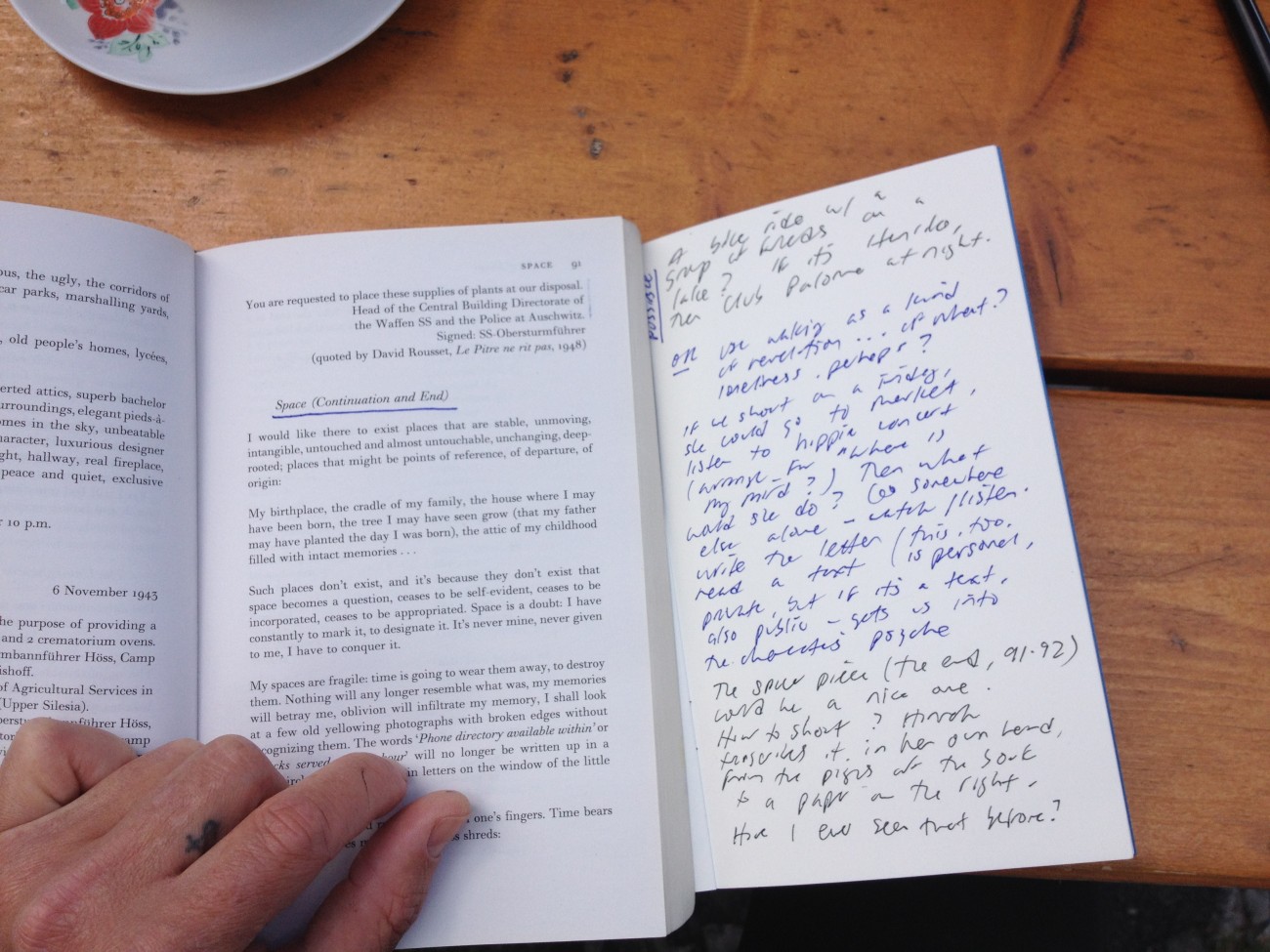
Photography by Matt Porterfield.
Such places don’t exist, and it’s because they don’t exist that space becomes a question, ceases to be self- evident, ceases to be incorporated, ceases to be appropriated. Space is a doubt: I have constantly to mark it, to designate it. It’s never mine, never given to me, I have to conquer it.
My spaces are fragile: time is going to wear them away, to destroy them. Nothing will any longer resemble what was, my memories will betray me, oblivion will infiltrate my memory, I shall look at a few old yellowing photographs with broken edges without recognizing them. The words ‘Phone directory available within’ or ‘Snacks served at any hour’ will no longer be written up in a semi-circle in white porcelain letters on the window of the little café in the Rue Coquillère.
Space melts like sand running through one’s fingers. Time bears it away and leaves me only shapeless shreds:
To write: to try meticulously to retain something, to cause something to survive, to wrest a few precise scraps from the void as it grows, to leave somewhere a furrow, a trace, a mark or a few signs.
How to incorporate these texts ?
One possibility is through voiceover, another is through dialogue (or recitation), another through titles. Another idea would be to photograph the text itself.
I considered an adaptation, but there’s no point in doing an adaptation of something that works perfectly in present form. There’s nothing to add but pictures, which only take away from the words. Instead, I’d like to extricate the mood, the focus, the form, and some of the words (with a nod), but put it all in service of the image, instead of the other way around.
Possible cinematographic references (in terms of combining text, sound, image) :
Hollis Frampton, Straub & Huillet, Miguel Gomes, Jean-Luc Godard
Been thinking a lot about space in terms of character, too : Hannah’s character and her relation to space, but also the characters in the building where she lives (where I live). Physical space, private and public, intimate space, as well as interior space, or the space of the imagination.
Sound is the other important formal element, which is, inherently, also connected to space. I want Hannah’s character (and the audience, in turn) to really listen. I’ve spent a lot of time listening since I arrived in Berlin and I think the sounds of the city are what I connected to first, as the physical space of the city is vast and harder for me to understand. When it comes to representation or depiction, I hope the sonic landscape of the film will convey this vastness by suggesting everything beyond the frame, beyond the character’s knowing (our knowing) and also create a dichotomy between the world of the character and the city itself.
And here are some sounds in the form of a list :
– sirena
– church bells
– bird songs
– my neighbor playing the ukulele
– wind in the trees
– the German language
– womens’ voices
– men’s voices
– the man who coughs (my private version of Poe’s Tell-Tale Heart)
– video games (first-person shooter)
– baby crying
– electric hum
– people fucking
– mourning (wailing)
– recycling bottles
– music: Tina Turner’s “What’s Love Got To Do With It ?”, techno, German rap,
free jazz, Grateful Dead, Persian love songs, a cover of the Stones’ “Wild Horses”
The sound of communication interests me, too. Language. Our protagonist is from North America, not a German speaker. How does she communicate ? Does it sound different when you speak English in Germany ? What does it sound like when everyone around you is speaking a language you don’t understand ?
A character receiving and reading letters from home, from somewhere “other”. How is this conveyed cinemato-graphically ?
Also : correspondence as communication. A character receiving and reading letters from home, from somewhere “other”. How is this conveyed cinematographically ? The correspondence itself (a letter) is evidence of another, invisible character in another time and space. For this character and the audience, hearing or reading the language of the “other” activates the imagination and creates a distinction between the character’s present and the “corresponding evidence” of another’s present. Who, then, is the main character ? What is the present ? Who is the audience ?
If I were casting this role, here is what I would write :
Looking for an actress between the ages of 18 and 25 with a history of something (buried, private) in her face. Great sadness and also light. An intelligence that burns. Capable of hysterical, comedic explosions. Also cruelty. Eyes are everything, mouth is second. Androgynous, sometimes masculine, but sexual energy is foreground. Actor must have focus, exceptional control of body and face, be comfortable with nudity.
Here is a possible order of scenes (written in first person) :
1. You come home at dawn (or maybe later), having been out all night. Maybe you are by yourself, maybe with friends. Either way, you enter the building alone.
2. You walk through the first section of the building, across a courtyard (maybe you lock up your bike), take the stairs. Each of these locations, though mundane, will give us an opportunity to show signs of others (people outside the frame). For example, there is literal writing on the wall of the building. There are bikes locked up in the courtyard. Perhaps a neighbor is coming out as you are going in. Maybe Achim is cleaning up from a party the night before. Maybe Frank is meditating in the shade. You walk up to the fourth floor. There are objects on each landing (a sofa section, a plant stand) and in front of each door (a keyboard, boxes, electric stove). Some of the doors are open and there are sounds coming from inside.
3. You open a door with your key and enter the apartment.
4. Once inside, you put your things down.
5. You go straight to the bathroom, where you piss and wash your face (the way only you wash your face, with big, careless splashes of water). Then you look at your reflection in the mirror. This private moment is important. Remember when I asked you what you do when you are alone? Do you sing a song? Maybe not yet. I would like to see you practice some “face yoga”.
6. You undress because your clothes smell like smoke. This happens on your way across the apartment.
7. You enter the bedroom, where your lover is still sleeping, finish undressing and crawl into bed. You wake him or her. Perhaps you make love. Maybe you have a conversation. Either way, in this intimate scene, the sounds of the world beyond the frame (of the building, the courtyard, the street) become foregrounded – not through the mix, they were always there, but it should be in this moment when the audience and the characters become aware of listening. The idea of having the audience connect with the sonic space of the film during a scene of lovemaking appeals to me, because it might create the audio equivalent of looking away; at the very least it will create some tension and desire to look away. In the end, you lay and listen, and maybe you fall asleep.
8. Dream sequence: something approximating minute 8 of Fiorucci Made Me Hardcore, a crowd of young people in the street, walking slowly, looking back at the camera in a way that is vaguely confrontational:
Notice : so far, in terms of space the scenes have moved from neutral public space (1) to community space (2) to private (4, 5) to intimate (7) to interior space (8).
If we are still in your lover’s apartment after the dream, it would be an opportunity to introduce another narrative element. Plus, up until now, it has not been revealed that you are transient (that you are only staying in this space temporarily) and this is an important reveal. For example, when you wake your lover is gone. Then your character would really be alone (in private), which might give her license to act freely or differently than we’ve seen her act before. Also, a new scene after waking might give us the opportunity to introduce another costume change. I like the idea of seeing your character change out of what she was wearing the night before and then putting something very different on. It can become a reoccurrence, if we want it to. I’d like to see you change clothes three times.
9. I want to really feel the cut to the next scene, especially through the audio. For some reason, I’m imagining you at a public pool with one child (or two), maybe reading a letter or writing a letter or reading a book. Perhaps the child isn’t revealed till later in the scene. The age of the child is yet to be determined, but we have a range of options. If not a pool, then a park.
10. Another scene with this child? Maybe you stop to get a snack. Maybe you go to the market. Maybe you watch the S-Bahn crossing in four directions on the bridge northwest of Humboldthain on your way home.
11. You take the child(ren) home to their parents. This will give us a chance to investigate a different kind of domestic scene. Here, I imagine when you arrive the mother is already there preparing for a weekend in the country. It is hectic, she is in a hurry, but the older child wants to show you something in his room. She invites you to come with them (or stay in their apartment while they’re gone) and you spontaneously agree (to go or stay).
In terms of plot, because right now there isn’t much, maybe we introduce a little conflict at this point. Perhaps, in the earlier scene with your lover, you tell him or her that you can’t do something or go somewhere because you’re going somewhere or doing something with the child and their family. Then, in this scene, you might tell the family the opposite. In this way, your character tells a lie. Even if the motives for this lie remain unclear, it would create some tension. If they are revealed, this could be interesting, too. Setting up a lie would give your character further license to act in a way that is surprising or “uncharacteristic”. The beauty is, since the audience hasn’t really been given the opportunity to get to know the character, strange or surprising behavior creates further tension. In the traditional narrative film, we know our protagonist and their goals in the first five minutes, and the rest of the film is spent watching them go through the motions of realizing this goal through the assertion of will (to paraphrase Raul Ruiz’s On Conflict Theory). In this film, we’ll create an unreliable protagonist with unclear motives.
The experience of living, even briefly, in an unfamiliar place, raises questions of identity.
Here is one reason : the experience of living, even briefly, in an unfamiliar place, raises questions of identity. You are a different person in Berlin than you are in North America. Back home, you have a history, as well as a present, but in Berlin you only have a present. This affords a certain kind of freedom. What would your character do with this freedom ?
After the family leaves, I think it would be nice if your character gets a kind of “Goldilocks” moment alone in this apartment. It would be another opportunity to explore space, introduce physical movement, text. Do you write your letter here? Pull books off the shelf and read them? Is this where we introduce the Perec ? Do you read excerpts aloud to yourself, to the room, to the audience ?
So, the big question, which I have yet to answer: what does your character do next ? I think I want to see her “get lost”, take a chance, play a role. I see this as a turning point, even if the action itself is not monumental. I think she should meet someone, most likely a stranger.
Here are some ideas about what could happen next :
– take a walk
– bike ride (alone or with friends)
– sit on the canal
– go to a strange bar, drink, begin a conversation with an older person who does not
speak much English. You give each other language lessons. Anything could happen from there… perhaps you take a tour of the Café Warchau museum alone after a conversation with the proprietor.
– Buy some pot, make friends with the dealer
– Hear some music. Or listen to some street musicians perform. I’m thinking about
Bresson’s Four Nights of a Dreamer. Really interested in these international hippie street musicians (the ones who I recorded playing this Pixies’ cover at Maybachufer Markt) and their groupies. Maybe you get lost with one of them.
– swim on a lake
– take the metro or the train, but nowhere in particular, meet someone
– nap at the communist monument
– buy some clothes or borrow them from a stranger (another costume change)
– pick someone up (think Gena Rowlands)
– cry inexplicably
– enter a neighbors apartment to retrieve something but end up staying
– follow a young woman your age (Celine & Julie)
– get on a boat
– make friends with someone who shows you their notebooks
– help strangers move into their apartment
Possible dialogue between you (A) and your lover (B):
B : “You come and go as you please.”
A : “Well, think about it for a minute. Isn’t that how you want it?”
B : “I think about living with you sometimes.”
A : “Really ?”
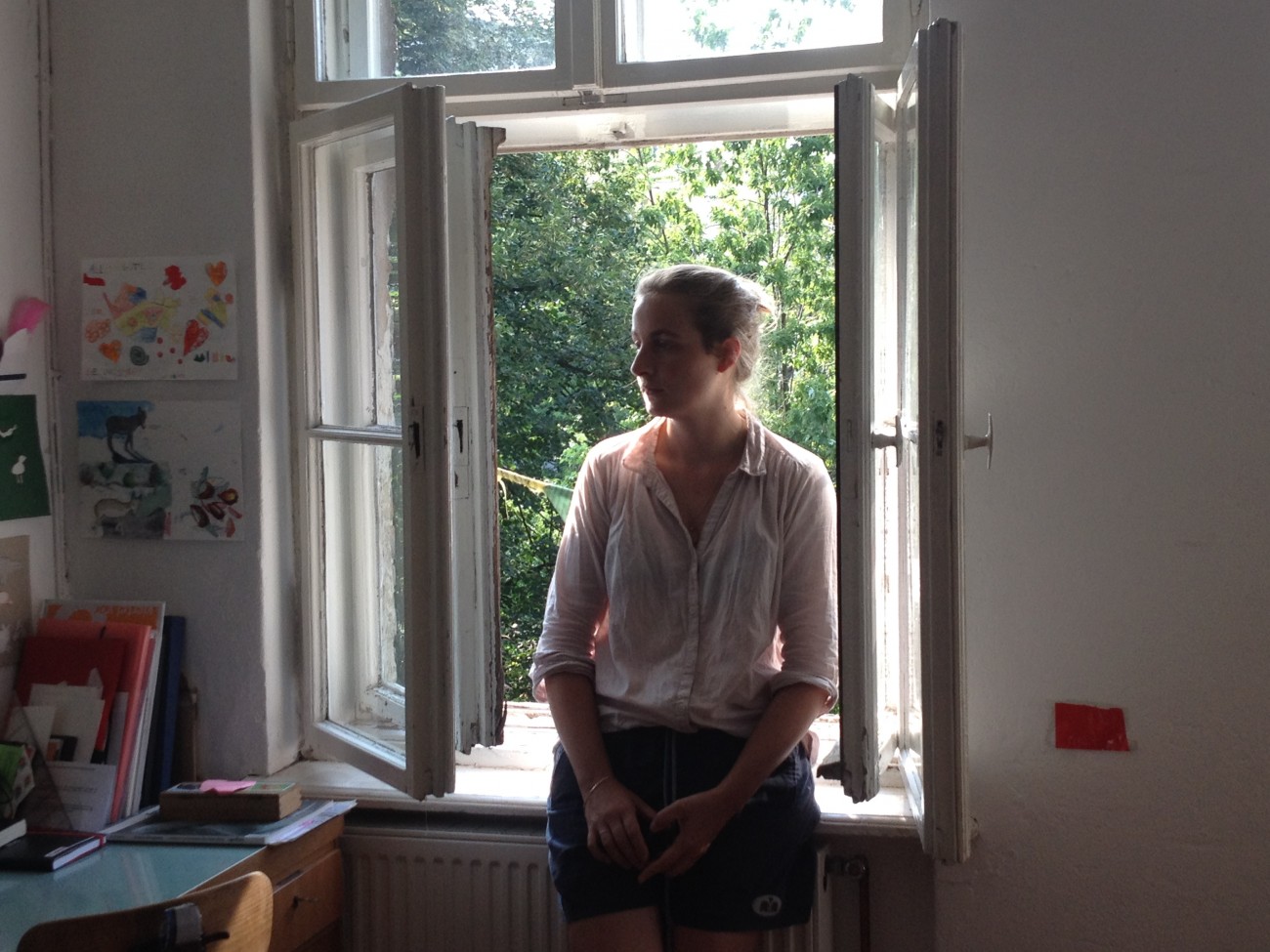
Photography by Matt Porterfield.
